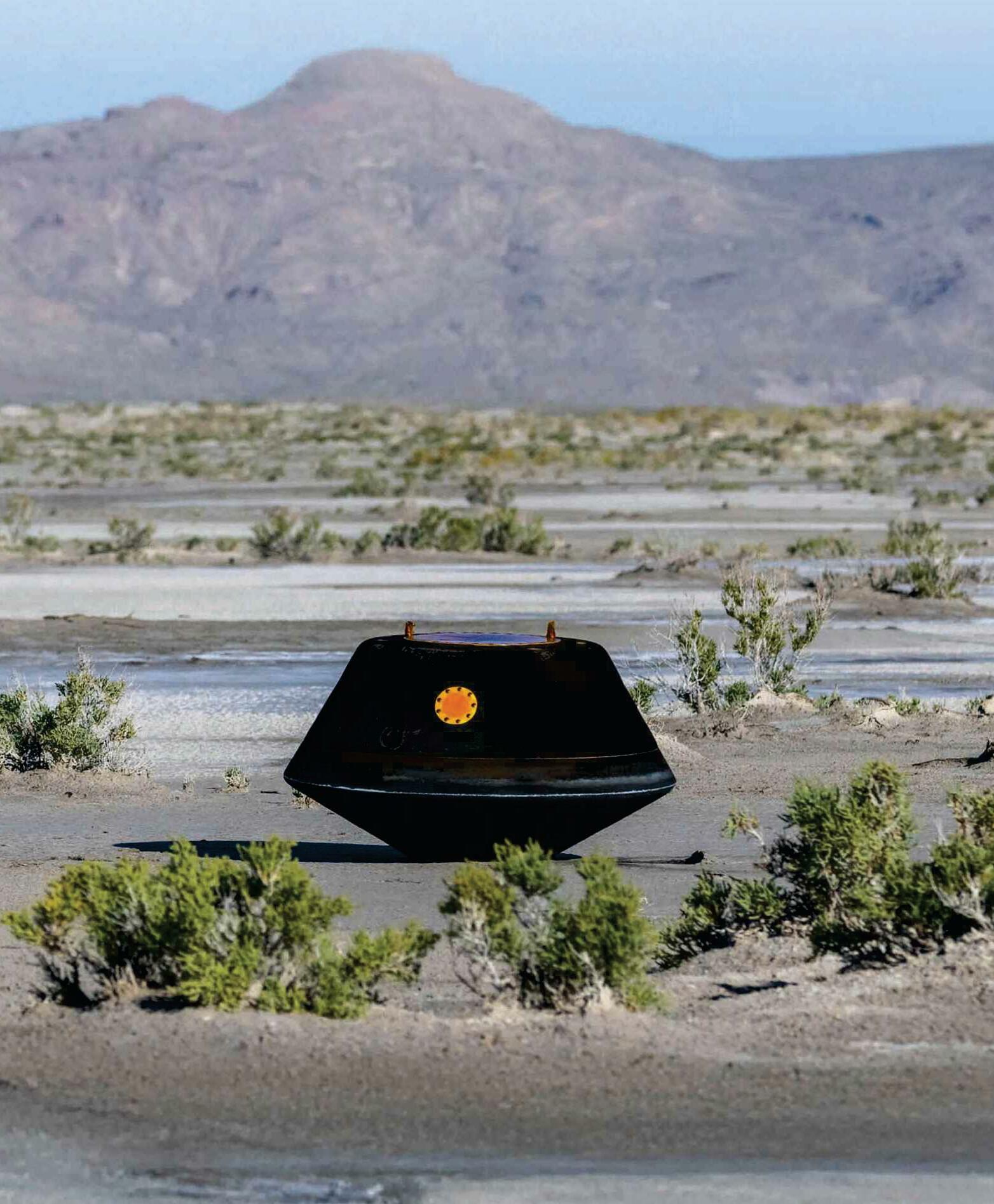試す 金 - 無料
Asteroid sample reveals life's origin
BBC Science Focus
|February 2025
A 'briny broth' may unlock the secrets of life on Earth... and further afield
-

Atiny piece of space rock has revealed that life on Earth may have come from an asteroid and hints that extraterrestrial life could be more likely than we thought.
Five years ago, a daring NASA mission named OSIRIS-REx saw a probe visit Bennu, an asteroid on a near-collision course with Earth, and collect a small sample of it. In late 2023, a capsule containing 120g (4oz) of the asteroid landed in the Utah desert, in the US.
Ever since, the world has been waiting to hear what the capsule held. Now, scientists have confirmed that the asteroid not only carries organic matter, but all of the ingredients that make up DNA.
Bennu – an object currently travelling around the Sun in an orbit close to Earth – is an ancient fragment of the Solar System. Its parent asteroid is thought to have formed around 4.5 billion years ago.
“We now know from Bennu that the raw ingredients of life were combining in really interesting and complex ways on Bennu's parent body,” said Dr Tim McCoy, curator of meteorites at the Smithsonian's → National Museum of Natural History, in the US, and the co-lead author on one of the new papers that announced the findings.
The breakthrough suggests that life formed on Earth after an asteroid collision, but it's also a sign that on Bennu's parent body or through other asteroid collisions, life has all it needs to begin elsewhere.
SOUP OF LIFE
 The most crucial finding is that Bennu seems to have hosted a 'briny broth' that allowed minerals and salts to intermingle. It's this concoction that developed into the complex structures that form the fundamental ingredients of life.
The most crucial finding is that Bennu seems to have hosted a 'briny broth' that allowed minerals and salts to intermingle. It's this concoction that developed into the complex structures that form the fundamental ingredients of life.このストーリーは、BBC Science Focus の February 2025 版からのものです。
Magzter GOLD を購読すると、厳選された何千ものプレミアム記事や、10,000 以上の雑誌や新聞にアクセスできます。
すでに購読者ですか? サインイン
BBC Science Focus からのその他のストーリー

BBC Science Focus
World's biggest cobweb is home to 100,000 spiders
Spiders don't normally create such large colonies, so there's no need to worry about finding one in your basement
1 min
February 2026

BBC Science Focus
A dementia vaccine could be gamechanging – and available already
Getting vaccinated against shingles could protect you from getting dementia, or slow the progression of the disease
1 mins
February 2026

BBC Science Focus
DATA IN SPACE
An unusual spacecraft reached orbit in November 2025, one that might herald the dawn of a new era.
7 mins
February 2026

BBC Science Focus
Climate change is already shrinking your salary
No matter where you live, a new study has found warmer temperatures are picking your pocket
4 mins
February 2026

BBC Science Focus
A MENTAL HEALTH GLOW-UP
Forget fine lines. Could Botox give you an unexpected mental health tweakment?
3 mins
February 2026
BBC Science Focus
Most people with high cholesterol gene don't know they have it
Standard testing struggles to detect the condition
1 mins
February 2026

BBC Science Focus
HOW CAN I BOOST MY IQ?
If you're serious about getting smarter, it's time to ditch the brain-training apps
4 mins
February 2026

BBC Science Focus
Humans are absolutely terrible at reading dogs' emotions
Think you can tell how our furry friends are feeling? Think again
1 mins
February 2026

BBC Science Focus
HOW TO TEACH AI RIGHT FROM WRONG
If we want to get good responses from AI, we may need to see what it does when we ask it to be evil
3 mins
February 2026

BBC Science Focus
What Australia's social media ban could really mean for under-16s
Many people think social media is bad for our kids. Australia is trying to prove it
5 mins
February 2026
Listen
Translate
Change font size

